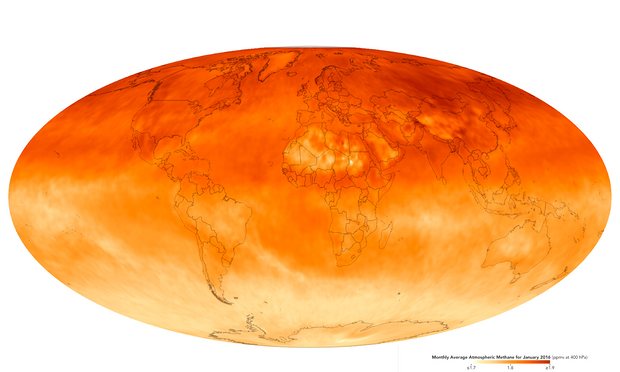Rapid rise in methane emissions in 10 years surprises scientists

Emissions of the powerful greenhouse gas methane have surged in the past decade, threatening to thwart global attempts to combat climate change. Scientists have been surprised by the surge, which began just over 10 years ago in 2007 and then was boosted even further in 2014 and 2015. Concentrations of methane in the atmosphere over those two years alone rose by more than 20 parts per billion, bringing the total to 1,830ppb. This is a cause for alarm among global warming scientists because emissions of the gas warm the planet by more than 20 times as much as similar volumes of carbon dioxide. In the meantime, emissions of carbon dioxide – the main component of manmade greenhouse gases in the atmosphere – have been levelling off. The new research, published in the peer-review journal Environmental Research Letters, suggests that the world’s attempts to control greenhouse gases have failed to take account of the startling rises in methane. The authors of the 2016 Global Methane Budget report found that in the early years of this century, concentrations of methane rose by only about 0.5ppb each year, compared with 10ppb in 2014 and 2015. The scientists speculate that agriculture may be the main source of the additional methane that has been recorded. However, they cannot be sure of all the sources, owing to a lack of monitoring. At least a third of methane comes from the exploitation of fossil fuels, including fracking and oil drilling and some coal mining, where methane is viewed as a waste gas and is frequently allowed to escape or, in some cases, flared off, which is less harmful. Unlike carbon dioxide emissions, however, which have been tracked in various ways since the 1950s, emissions of methane are poorly understood and could represent a threat that scientists have still not accounted for. For instance, the melting of the Arctic tundra releases methane as the vegetation underneath is gradually and sometimes suddenly exposed. This has been regarded by scientists as a potential “tipping point” whereby warming of the Arctic leads to greater releases of methane, therefore greater warming, in a runaway and uncontrollable cycle.

